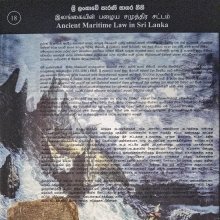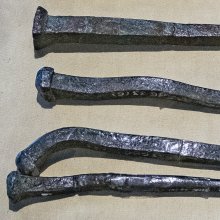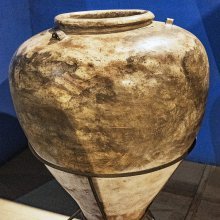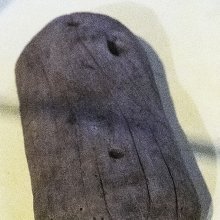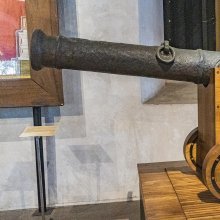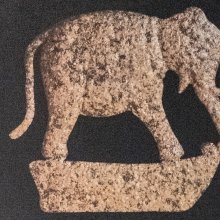Ship: 2 definitions
Introduction:
Ship means something in Hinduism, Sanskrit, the history of ancient India. If you want to know the exact meaning, history, etymology or English translation of this term then check out the descriptions on this page. Add your comment or reference to a book if you want to contribute to this summary article.
Images (photo gallery)
(+12 more images available)
In Hinduism
Yoga (school of philosophy)
Source: ORA: Amanaska (king of all yogas): A Critical Edition and Annotated Translation by Jason BirchA Ship is denoted by the Sanskrit term Nau, according to the Amanaska Yoga treatise dealing with meditation, absorption, yogic powers and liberation.—Accordingly, as Īśvara says to Vāmadeva: “[...] As long as the highest reality is not known, the mind is unrestrainable. However, when the highest reality is known, the mind becomes [still] like a crow [perched] on the mast of a ship (nau). [...]”.

Yoga is originally considered a branch of Hindu philosophy (astika), but both ancient and modern Yoga combine the physical, mental and spiritual. Yoga teaches various physical techniques also known as āsanas (postures), used for various purposes (eg., meditation, contemplation, relaxation).
India history and geography
Source: Singhi Jain Series: Ratnaprabha-suri’s Kuvalayamala-katha (history)Ships or Boats were commonly employed for Sea-voyages in ancient India (known in Prakrit as: jattā, or Sanskrit: yātrā), and was vividly depicted in the Kathās (narrative poems) such as Uddyotanasūri in his 8th-century Kuvalayamālā (a Prakrit Campū, similar to Kāvya poetry).—Details of preparation for sea-voyage are given which include the following items relating to preparatory ritual and the equipment of the ship: [e.g., arrangement of boats or ships;] [...]. When the ship was to take off auspicious musical instruments were sounded, conch-shells were blown, auspicious songs were sung, Brahmins muttered the āsīsā; and thus in the sound of invocation and jaya jaya the ship took off its voyage, the sails were unfurled, the ropes and riggings were pulled up, the oars began to be operated, the helmsman took observations, the ship fell into its course, favourable winds began to blow: thus the ship started its journey being tossed on the high sea waves.

The history of India traces the identification of countries, villages, towns and other regions of India, as well as mythology, zoology, royal dynasties, rulers, tribes, local festivities and traditions and regional languages. Ancient India enjoyed religious freedom and encourages the path of Dharma, a concept common to Buddhism, Hinduism, and Jainism.
See also (Relevant definitions)
Starts with (+24): Shipa, Shipai, Shipaibana, Shipaigiri, Shipaiki, Shipaipyada, Shipaka, Shipala, Shipali, Shipalila, Shipalya, Shipara, Shiparashi, Shiparassu, Shiparasu, Shiparasupatra, Shiparimuli, Shipataka, Shipatanem, Shipatara.
Query error!
Full-text (+785): Nau, Jalayana, Yanapatra, Pota, Vohittha, Mangini, Jahaja, Aramara, Naubandhana, Yana, Nautarya, Navya, Tarani, Arnavayana, Sunau, Nauka, Arnavapota, Polinda, Pravahana, Potra.
Relevant text
Search found 261 books and stories containing Ship; (plurals include: Ships). You can also click to the full overview containing English textual excerpts. Below are direct links for the most relevant articles:
Heimskringla (by Snorri Sturlson)
Part 111 - Consultation Of The Kings < [Chapter VI - King Olaf Trygvason's Saga]
Part 44 - Earl Sigvalde's Flight < [Chapter VI - King Olaf Trygvason's Saga]
Part 116 - Flight Of Svein And Olaf The Swede < [Chapter VI - King Olaf Trygvason's Saga]
Village Folk-tales of Ceylon (Sri Lanka), vol. 1-3 (by Henry Parker)
Story 233 - The Fortunate Boy < [Part III (b) - Stories of the Western Province and Southern India]
Story 246 - The Way in which the Prince traded < [Part III (b) - Stories of the Western Province and Southern India]
Story 261 - How they formerly Ate and Drank < [Part III (b) - Stories of the Western Province and Southern India]
Kathasaritsagara (cultural study) (by S. W. Chitale)
Sea-Borne Trade < [Chapter 3 - Economic Conditions]
Articles of Trade (Import and Export) < [Chapter 3 - Economic Conditions]
Royal Transport (for journeys or excursions) < [Chapter 2 - Political conditions]
Indian Mercantile Marine and the Coastal Traffic Reservation Bill < [November-December, 1929]
Haven of Heart’s Desire < [July – September, 1985]
Maritime Tradition of Andhra < [April – June, 1982]
Yavanajataka by Sphujidhvaja [Sanskrit/English] (by Michael D Neely)
Verse 4.24 < [Chapter 4 - The Rule of the Objects of the Zodiac Signs and Planets]
Tilakamanjari of Dhanapala (study) (by Shri N. M. Kansara)
15.6. Maritime activities and naval expedition < [Chapter 14 - Political data]
Friendship between Harivahana and Samaraketu < [Chapter 6 - Summary of the Tilakamanjari]
12. The ceremony of Yatramangala (setting out on an expedition) < [Chapter 11 - Social Data]
Related products
